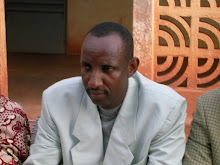ARE THE STRATEGY AND APPROACH OF THE WAYS OF CONFLICTS MANAGEMENT BY THE STATE AND TRADITIONAL LEADERS ADAPTED TO LOCAL COMMUNITIES CONCERNS IN THE MACINA OF THE MOPTI REGION? Boubacar Ba
Conflicts question various aspects linked to the management of pastoral resources in the Delta of the River Niger and the future of social relationships among the communities in this area. The communities consist of farming, pastoral, fishing and fish-breeding populations. There exists a linkage of production systems among the different actors. But, we have to clearly notice that, beyond an old rivalry among the communities, the conflicts are engendered by the well-known lack of administration authority, corruption of justice and community leaders and impunity facing some behaviors of the citizens.
During the Dina (Fulani Kingdom in XIXth century), the most illustrative example was that of Guelajo Hambodejo, a Fulani warrior of Kounary (socio-ecological entity of the Niger Central Delta) who did not have good relationships with the chief of the Dina, Sekou Ahmadou. Guelajo Hambodejo who had convinced Sekou Ahmadou to settle in Hamdallaye, the capital city of the Dina, became later, according to circumstances, the first public enemy of the power in office. He conspired against the Great Imam, relying on accomplices’ help that he didn’t get. So, he was arrested, judged by the Great Assembly and was condemned to be bitten of 80 (eighty) strokes of crop before the audience.
Some influential people like Boureima Kalilou, a Diawando (social ethnic group in Macina), big negotiator of his state, could influence decisions. In fact, he advised not to humiliate Guelajo Hambodejo and recommended to take him prisoner, for fear of giving rise to revolts, because the warrior in disfavor, rebellious to the principles that governed the City, was famous. This example of negotiation is cited in the Macina.
Thus, many conflicts were presented in the form of a series of questionings that actors of the Dina clarified meticulously, with respect and responsibility. The assistance of legal experts and scholars of the Great Assembly permits to control resources management with a pastoral code taking into account the concerns of all of the users of the Delta space in disputes resolution.
Today, with the modern and democratic State, there are many questionings about administrative, institutional and judicial institutions ability of managing and resolving organizational, institutional and social conflicts. The question is to know the degree of reliability of the mediation mechanism of judges and traditional leaders with the responsibility of negotiations prerogatives.
The competition for the access to agro-pastoral space that appears to be implicit in the conflict, brings out pre-existing tensions to the conflict itself. The first divide is the non understanding of a large part of protagonist actors of the institutional aspect of conflicts management (Laws, Texts, Decisions, Decrees) and the method of disputes resolution. The second divide is linked to the lack of authority of the structures of traditional management of conflicts and the absence of local institutions authority. The third divide is the land tenure competition causing differences of interest among actors, i.e. finally the existence of real constraints of production linked to the weak consultation of local decision-makers.
With these stakes, is the Macina going to become like a space in which conflicts arise, grow but never die. The challenge is launched at all development actors: State, decentralized territorial Communities, civil society, private sector… The solution remains open.
Subscribe to:
Post Comments (Atom)

No comments:
Post a Comment